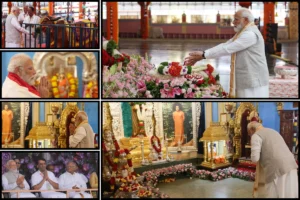
Migration Crisis
Hundreds of migrants are still stuck at the Chile-Peru border, unable to enter Peru in an attempt to return to their native Venezuela, and the migration crisis there worsened on Thursday.
The majority of the migrants are from Venezuela, and they are trying to enter Peru in order to travel back to their homeland, but Peru is refusing them entry since they do not have the necessary paperwork.
The migrants are confronted with the hostile conditions of the Atacama Desert, one of the driest on the globe, with brutally scorching days and intensely cold nights, while stranded at the borders of the two South American nations.
Some have improvised tents with blankets but they lack water and other basic services.
A group of migrants ran through the desert toward Peru, but they were turned back by Peruvian officers. Some women complained and demanded that the government of President Gabriel Boric provide a bus for them to travel to Venezuela.
Images showed migrants shoving Peruvian border patrol officers in an effort to enter the country.
Officials in Arica, the northern Chilean city that borders Peru and is around 2,000 kilometers (1,245 miles) from the capital of Santiago, declared a migration emergency Thursday.
A day earlier, the Peruvian president, Dina Boluarte, declared a state of emergency in Tacna, a town near the border with Chile, in order to “preserve domestic order” and contain the arrival of migrants. In announcing the measure, the president attributed “criminal acts” to migrants.
Arica’s mayor, Gerardo Espíndola, vowed to “provide resources” to support those in need, particularly children and the elderly.
“We will act as quickly as this critical situation affecting the people stranded at the border requires,” Espíndola said.
Amid the impasse, the head of Chile’s lower house of Congress, Vlado Mirosevic, called for a humanitarian corridor involving all the countries in the region to resolve the crisis and allow migrants safe passage back to Venezuela.
Chile’s foreign minister, Alberto van Klaveren, warned there was “a significant humanitarian problem in the area” and said Boluarte’s decision “increases pressure” at the border.
The departure of migrants from Chile comes shortly after the National Prosecutor’s Office on April 10 called on prosecutors to request preventive detention for anyone caught committing a crime who could not prove their identity.
In addition, a measure is set to be debated in the lower house of Congress that would classify irregular immigration as a crime and proposes jail sentences of as many as 541 days for anyone caught entering Chile through unofficial channels.
To read more such news, download Bharat Express news apps






















